Hotdogs, hot data & home runs: What MLB’s World Series is really like
‘There’s the game you see, and there’s the game you don’t.’ Jonathan Liew crossed the pond for a taste of Major League Baseball – and here's what he found

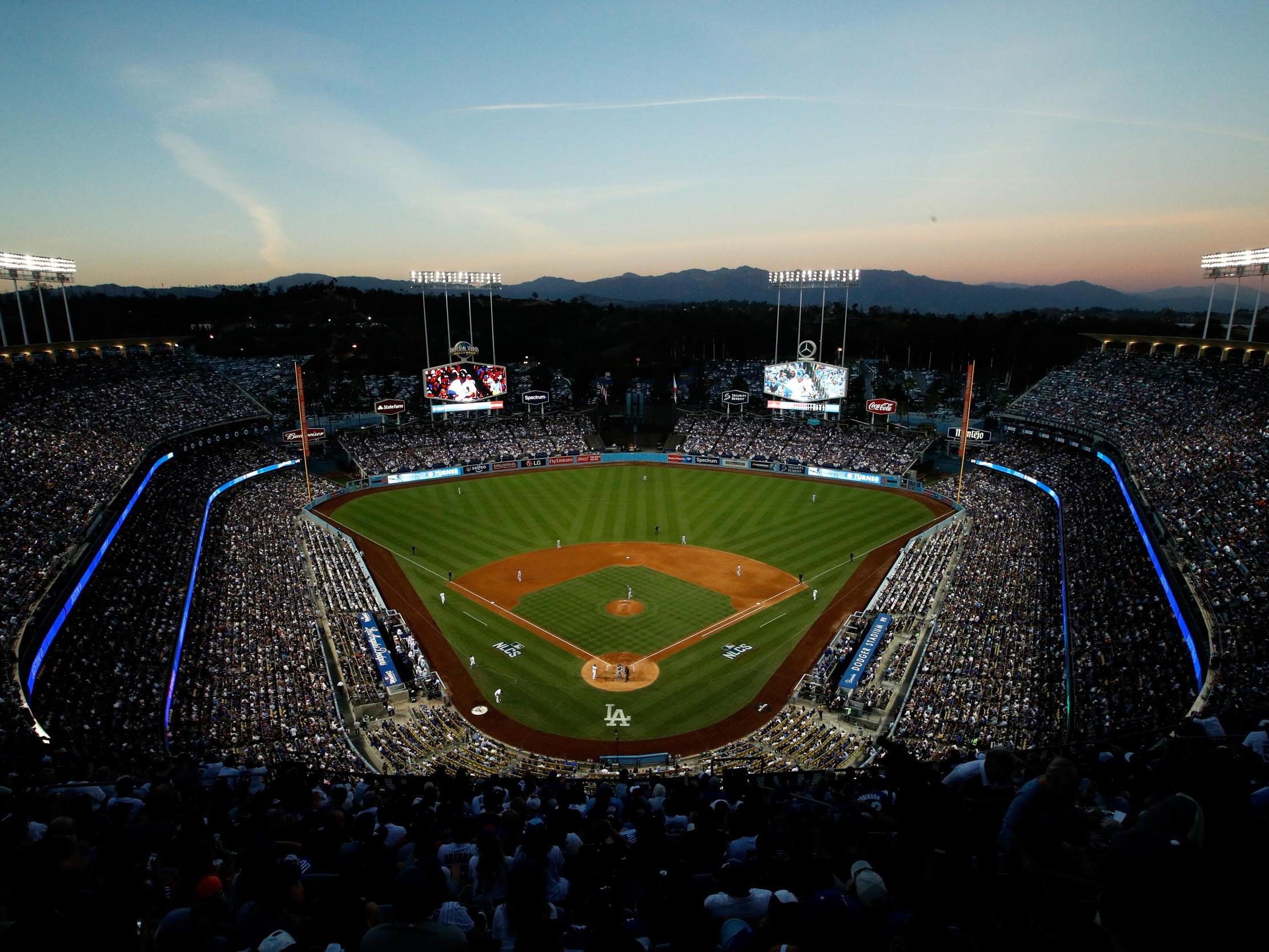
The diameter of a baseball bat is around 2.6 inches at its widest point, which makes it slightly narrower than a tin of baked beans. It’s just over a metre long, although only a tiny fraction of that is actually useful for the purposes of hitting a baseball. The ball itself is just under three inches in diameter, and can be delivered at speeds of 100mph. When facing a fastball at that speed, as Max Muncy of the Los Angeles Dodgers is preparing to do, the ball will travel from hand to home plate in just 400 milliseconds, or roughly the time it takes to blink and open your eyes again.
The reaction time, however, will be significantly lower than that. For one thing, it’ll take the batter around 100 milliseconds even to register the fact that there’s a ball heading towards him in the first place. The last 150 milliseconds will be spent swinging the bat, if he chooses to do so. In reality, then, the multitude of decisions and judgements that a batter makes every time he faces a pitch – where the ball is, where it’s going to be, whether it’s in the strike zone or not, where the fielders are, where the runners are, the count, the game situation – is condensed into about a quarter of a second.
That’s assuming it is a fastball, of course. Often it’s something else entirely. It could be the curveball. The slider. The change-up. The splitter. The knuckleball. The screwball. The spitball (although the pitcher would be in terrible trouble, given it was banned in 1920). Even the fastball comes with its own subset of subtle variations: the four-finger, the two-finger, the cutter, the sinker, all with their own unique trajectories. Miss the sweet spot a few millimetres high, and the ball will scuff along the ground for an easy retrieval. Miss a few millimetres low, and the ball will skew high in the air for an easy catch. Mistime your swing – even by milliseconds – and the ball will likely slice away for a foul.
There’s a reason hitting a baseball is sometimes described as the hardest thing to do in the whole of sport. Even the very best fail overwhelmingly often. For example, Muncy faced 2,066 pitches during the 2018 regular season, and registered 104 hits. That means 95 per cent of the time he sees a pitch, he’ll either leave it alone, swing and miss, swing and foul, or swing and get out. And this in what has been by far the best season of his career.
Baseball, as you may have gathered, is a sport drowning in numbers. The average Major League Baseball game generates seven terabytes of uncompressed data. Each year thousands of scouts accumulate millions of miles, criss-crossing the country keeping tabs on talent. By the time he reaches the major leagues, every player is a walking statistical capsule, his every twitch and trait chronicled, his every dimension and predilection logged. And yet the story of Muncy proves that for all the numbers and information in the world, sometimes – as the legendary Houston Astros and St Louis Cardinals pitcher Joaquin Andujar once put it when asked to define baseball in one word – youneverknow.
Muncy is 28 years old, and until a few months ago even hardcore Dodgers fans wouldn’t have been able to pick him out of a police line-up. Virtually nothing in his background – two underwhelming years with the Oakland Athletics, a winter spent playing for Jalisco in the Mexican League – suggested a star in the making. “As a first baseman without big home run power,” one early scouting report read, “it will be tough for him to force his way into a job.”
At the start of 2017, the Athletics let him go. Muncy was unemployed. He considered going back to college and finishing his business degree. Instead, he decided to make a few changes to his swing, secured a minor-league contract with the Dodgers, and after a year in the minor leagues was called up to the majors in 2018, hoping for an occasional role as a pinch hitter. Instead, he enjoyed the season of his life, hitting 35 home runs and finally establishing himself in the big-time.
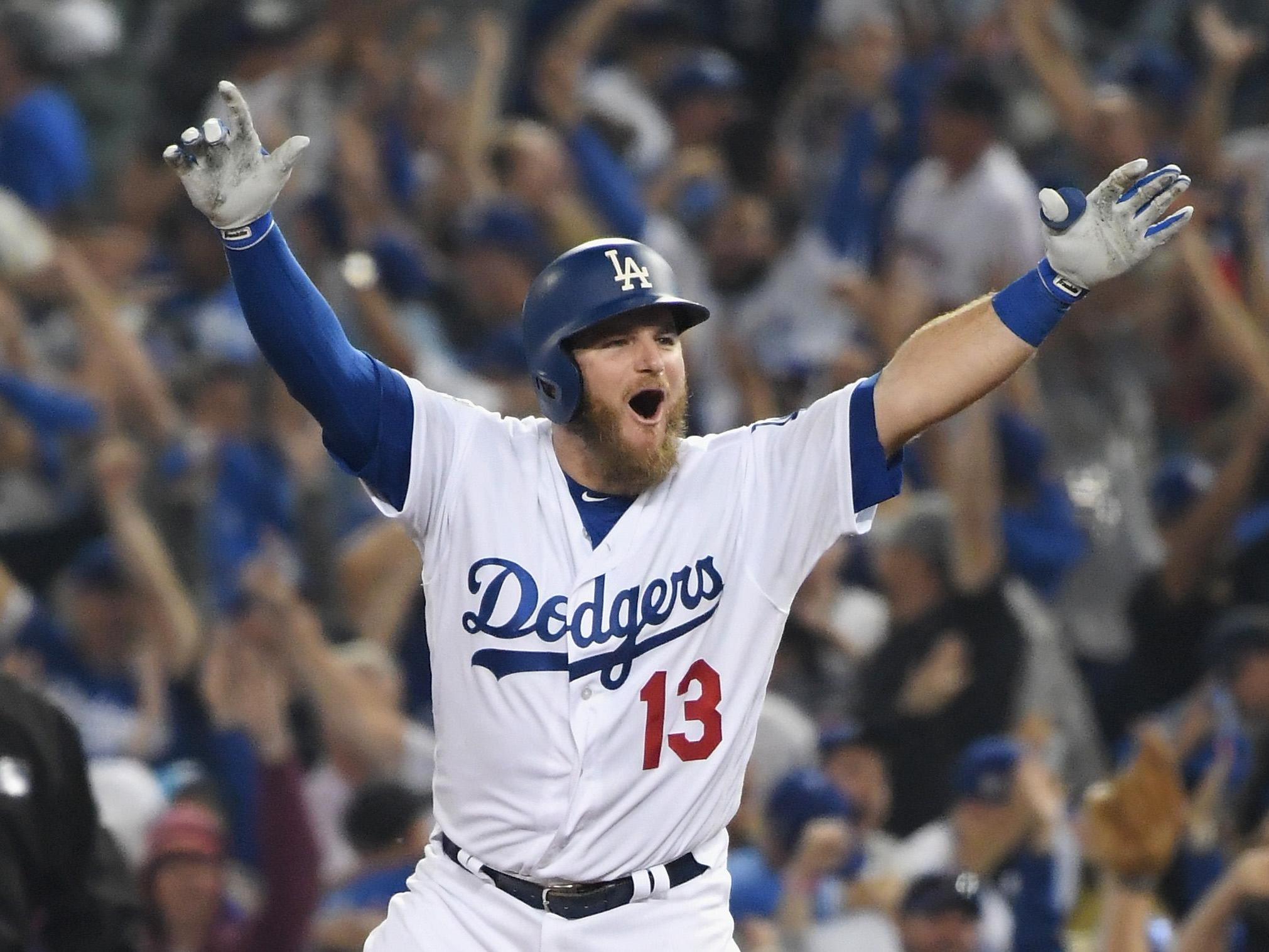
And yet even in his career breakthrough season, only five per cent of his pitches ended in a hit. This, in many ways, is baseball’s founding principle: on an average day, in an average game, on an average ballpark against an average pitcher, a batter steps up to the plate knowing the odds are resoundingly stacked against him. But this isn’t any of those things. It’s game three of the World Series, and the Dodgers – already 2-0 down to the formidable Boston Red Sox in the best-of-seven series – are deadlocked.
The average baseball game is over in a tidy three hours, lasting nine innings a side before going to sudden death. This game is in its 18th inning, and has lasted more than seven hours. It’s been tied since the eighth inning, we’re past midnight on the West Coast, and the crowd at Dodger Stadium are slipping into a sort of hallucinogenic delirium. Nathan Eovaldi, the relief pitcher for the Red Sox, is now on his 97th pitch (by way of surreal comparison, imagine coming on as a late substitute in a football game and seeing out a full 90 minutes). The popular baseball standard ‘Take Me Out To The Ball Game’ – usually aired in the middle of the seventh inning – has tonight been played twice.
Already, this is by far the longest World Series game in history. Some wise old sage in the press box notes that this game has already lasted longer than the entire 1939 World Series. On top of that, it’s been a long season. This is the Dodgers’ 177th game in 212 days. Minds are weary. Joints are sore. And yet the entire game, the entire series, perhaps even the entire season, could hang on just one hit. If Boston get it, their 3-0 lead will be virtually impregnable. If Los Angeles, well… youneverknow.
Eovaldi winds up. It’s a full count, meaning three balls and two strikes. Eovaldi delivers a 90mph fastball: not his most venomous, but directed towards the outside corner of Muncy’s strike zone as a left-hander. A fraction of a second later, Muncy bends his knees, lowers into his stance, and swings his skinny little baked-bean-can bat with the devastating economy of pure instinct. The contact is clean. The ball flies into left field, roared on by 50,000 Dodgers fans who have stayed to the sweet, sweet end.
Around five seconds after leaving Muncy’s bat, and around 116 metres away, the ball plops over the fence. A game-winning home run, to rescue the World Series, in the longest postseason game ever played in the history of Major League Baseball. As Muncy jubilantly throws off his cap and rounds the bases to be met by the disbelieving embraces of his team, he could be forgiven for giving quiet thanks that he never did go back to college and finish that business degree.
---
You’re probably familiar with the imagined language of baseball, even if you’ve never seen a game in your life. Someone throws you a curveball. You touch base with a client. An idea comes out of left-field. You ask for a ballpark figure. Three strikes and you’re out. You may even take a raincheck, which was originally a replacement ticket offered to baseball spectators when matches were postponed due to bad weather, valid for admission at a later date.
That’s the imagined language of baseball. The real language of baseball is a little more perplexing: an abstruse argot that to the uninitiated and the unwary may as well be Welsh, or Urdu, or one of those African languages with the clicking noises.
“You mentioned their versatility in terms of their line-up and Mookie and the DH situation, and possibly playing the infield,” a reporter asks Dodgers manager Dave Roberts.
“It’s a possibility,” Roberts admits. “I know he hasn’t played a whole lot of second base. And Alex is going to do his things, to kind of maximise his matchups. And you’ve got to net it out. I’m sure him and Ron Roenicke, they’ll be able to navigate through a National League game, I don’t see any problem.”
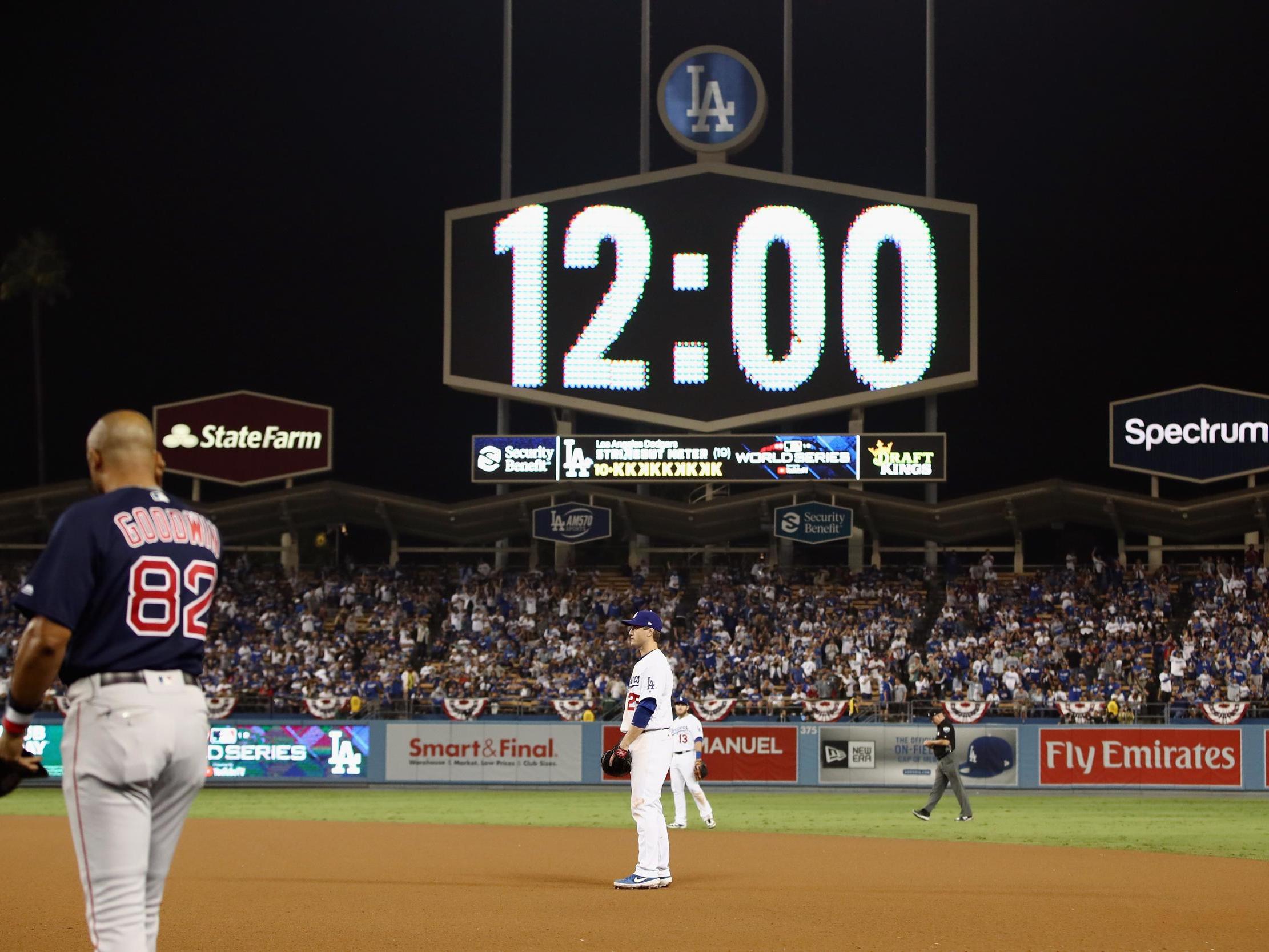
You can probably take a stab at what some of those words mean, but shorn of context or experience: not a clue. And for the fleeting World Series tourist, even one thoroughly versed in sporting esoterica through a lifetime spent following – say – cricket, baseball can feel less like a game and more like a giant puzzle: a soup of strange words and strange numbers, familiar shapes in an unfamiliar setting, a tangled and intricate tableau that only reveals itself in the very fullness of time, and in the meantime offers only questions. How does a pitcher get so much action on the ball? Why on earth would you intentionally walk a batter? And if your starting pitcher is so hot, how come you haven’t played him for the last four days?
To those steeped in the game, of course, this sort of thing is second nature. “If you’ve grown up with baseball, then it’s not a complicated sport,” one local journalist explains. Then again, as he admits, he’s been watching it for 28 years. I make a quick calculation based on my current age and realise with alarm that even with a fair wind, I’ll be 60 before I fully understand baseball. Even with the generous deadlines at The Independent, there’s no way they’re giving me that long to write this piece.
So in desperate need of a shortcut, I head down to the organised chaos of batting practice, where exceptionally bulky men thwack baseballs around in the midst of what can only be described as an utter circus: a phalanx of television crews all filming pieces to camera, journalists and VIPs milling around and catching up with old friends, the umpires solemnly striding past to inspect the boundaries, a team from the Ellen DeGeneres show conducting an interview with an earnest-looking eight-year-old boy in an umpire’s outfit.
A man named Dave Dombrowski, president of baseball operations at the Red Sox, very charitably offers to give a beleaguered British journalist a few pointers. “It’s kind of like when I watch cricket or rugby,” he laughs. “I’d say a couple of things. Keep an eye on the starting pitcher. He’s the key to the game. And the second thing is getting guys on base. If one team is consistently getting guys on base, that’s a pretty good indicator of which way things are going.”
The game begins, after the sort of chintzy opening festivities that America has turned into a fine art. A fiesta of fireworks. Some soft-rock monstrosity masquerading as the Stars and Stripes. Fighter jets in formation. Enough soldiers to annexe a small island nation. Literally the biggest flag I’ve ever seen in my life. The camera wastes no time in zooming in on some of the prominent celebrities perched in the posh seats, just behind home plate: Larry King, Jason Bateman, Rob Lowe, Kobe Bryant.
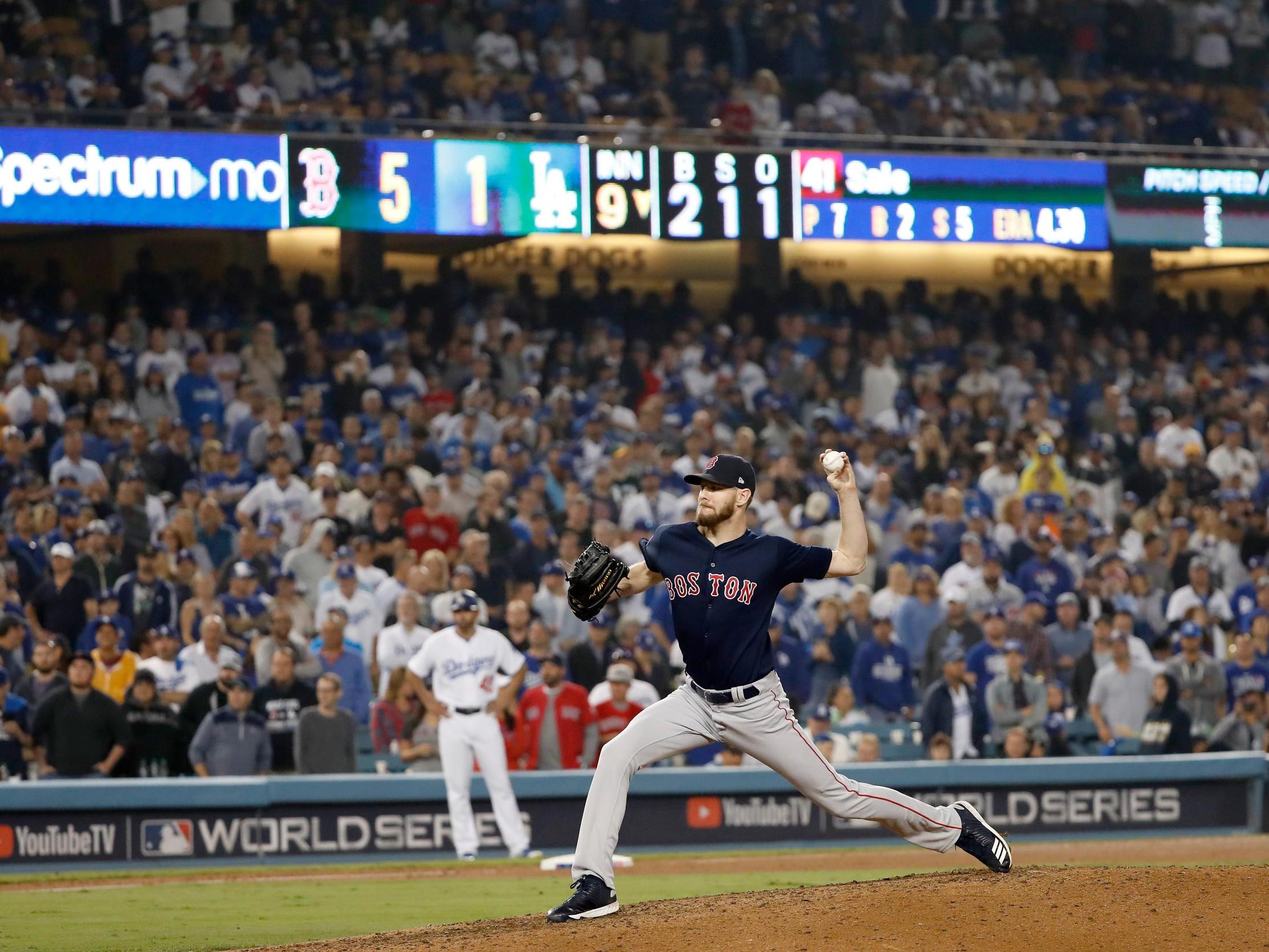
But I’ve gone in the other direction, right up to the top deck on the ninth floor, where you find the cheapest tickets and the best atmosphere. Here, partisan home fans wildly celebrate every hit, every strike and every marginal call by high-fiving anyone within range. Some even bring mitts in the hope of catching foul balls. During the break between innings, they queue up to wash the whole experience down with industrial quantities of food: hot dogs, garlic fries, pizza slices the size of a ringbinder, baseball helmets filled with nachos and guacamole.
There are 81 home games in a regular baseball season, but as I chat to fans on the top deck, it turns out that virtually nobody goes to all of them. For the majority, following a baseball team is a mixed-media experience, a collage of boozy evenings in front of the telly, radio commentaries in the car or truck, workplace fantasy pools, and arguing with strangers online about who screwed up on a particular play. Baseball fans love nothing better than arguing about who screwed up. In a way, it’s an inversion of the customary proverb: in baseball failure has many parents, success is an orphan.
“The game will tell you something,” says Alex Cora, manager of the Red Sox. “You just have to pay attention to it.” And as a glorious red sunset settles on Dodger Stadium, slowly and by degrees the game begins to draw me in. It’s only when studying closely that you begin to grasp the epic, gladiatorial quality of the duel: the way pitcher and batter eye each other up with a grudging respect, sanctifying their respective spaces in preparation for battle. Red Sox starting pitcher Rick Porcello tugging on virtually every loose appendage before he delivers the ball: his earlobes, his collar, his shirt front, both shoulders. The enormous Cuban Yasiel Puig, who’ll hit a three-run homer in game four, thrashing himself all over with his bat, as if flagellating himself with a birch. Like any well-established sport, baseball strikes me first and foremost as a game of rituals.
It’s a taut, tight game. The Dodgers take the lead with a home run at the bottom of the third. The Red Sox level in the eighth, go 2-1 up in the 13th, and then as night falls, surrender their advantage almost immediately through an error by pinch runner Ian Kinsler. Then, with the stadium clock showing 12.30am, Muncy strikes. A feral roar of relief washes over the ballpark, accompanied by a stampede of spectators rushing back from the toilets and the smoking areas. “You want baseball explained to you, my media friend?” exclaims one ecstatic Dodgers fan, recognising me from earlier. “Explain this: how come every time they hit a home run, I’m not in my fucking seat?”
---
There’s the game you see, and there’s the game you don’t. The following night, as Puig’s enormous three-run homer puts the Dodgers into a commanding 4-0 lead in Game Four, the analytics website FanGraphs puts the Dodgers’ win probability at 95.4 per cent. It’s the 55th time the Dodgers have been four runs ahead this season, and they’re yet to lose. But youneverknow. In the seventh inning, the Red Sox claw them back to 4-3. In the eighth, they level. In the ninth, as the Dodgers go to pieces, relief pitcher Dylan Floro is taken for five runs. The game finishes 9-6, the Red Sox 3-1 up, the World Series all but over.
It’s not just the 54,000 in Dodger Stadium taking it all in. “Watching the Dodgers/Red Sox final innings,” tweets Donald Trump from his fast-food presidential bunker. “It is amazing how a manager takes out a pitcher who is loose and dominating through almost 7 innings, Rich Hill of Dodgers, and brings in nervous reliever(s) who get shellacked. 4 run lead gone. Managers do it all the time, big mistake!”
Hill’s response, meanwhile, is note-perfect. “There was a mass shooting yesterday,” he responds when informed about the comment. “The focus of the president, in my opinion, is on the country, not on moves in a World Series game.” But it’s a reminder that on a weekend when all four sports teams in Los Angeles – the Lakers, the Kings, the Rams and the Dodgers – are all playing at home for the first time in history, the World Series still exerts a special and unique grip on the national consciousness.
To be a fan of almost any sport in 2018 is to be part of an almost constant existential monologue, and baseball is no exception. Average attendances this year declined to their lowest level since 2003. According to the Sports Business Journal, the average age of a baseball viewer on television is 57. The percentage of African-American players – for decades the lifeblood of the game – has been in regression for a generation. Shifting consumer and social trends are cited as one issue; defensive dominance another. For the first time in the league’s history, 2018 saw more strikeouts than hits.
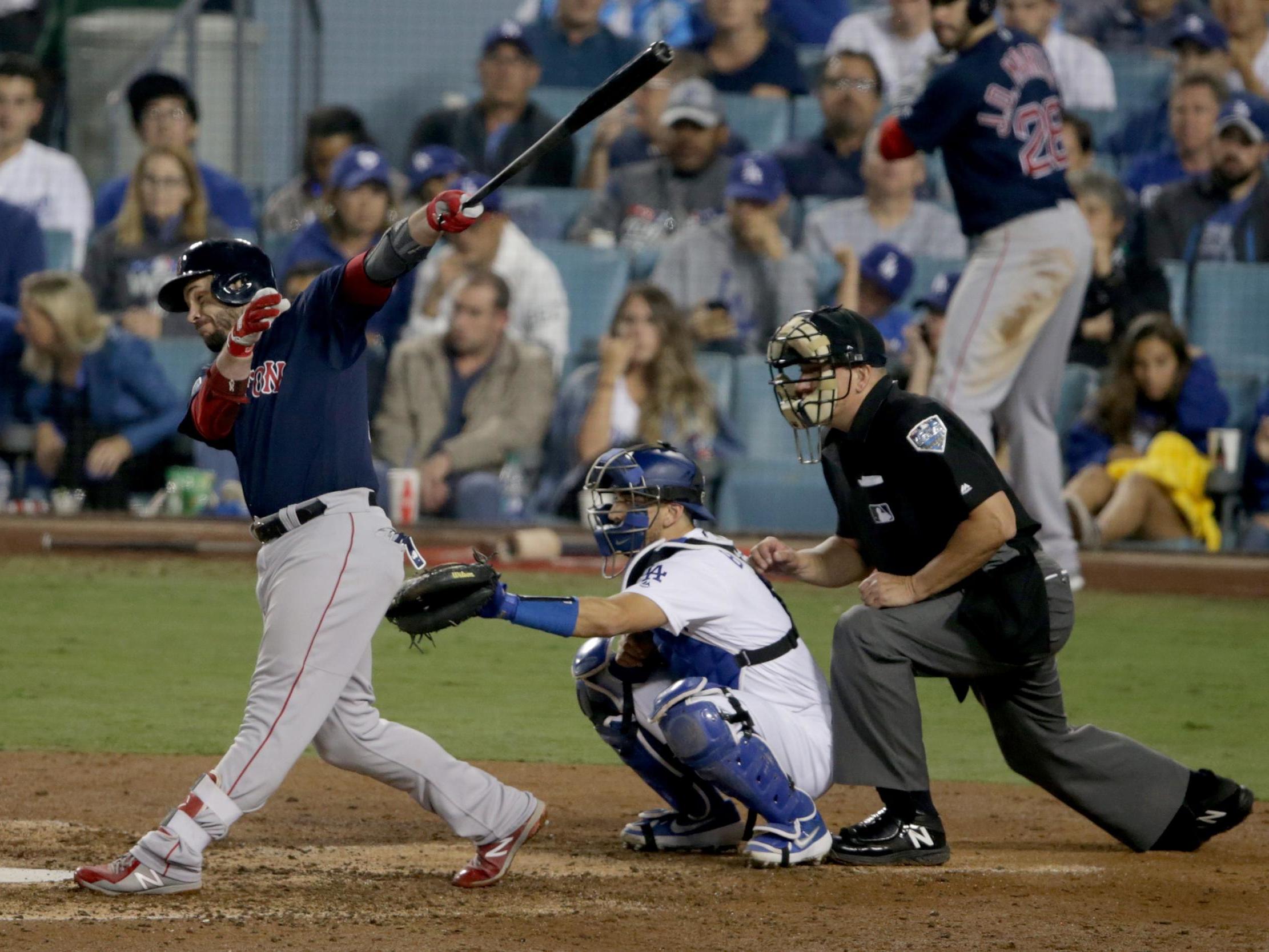
Yet the sport has scarcely been resistant to change. MLB commissioner Rob Manfred claims that baseball has been the fastest-growing sport in the US for each of the last three years, and is the most-played sport by children under 12. He points out that African-American players make up 20 per cent of first-round draft picks over the last five years, against a current league rate of eight per cent. The MLB’s much-lauded digital strategy, which sees traditional broadcasters sharing rights with new media companies like Twitter, Facebook and the MLB’s own streaming service, has allowed it to reach multiple audiences at once.
And in a way, baseball has been “in decline” in one form or another pretty much since it started. Its timelessness, its traditional values, its umbilical link with its heritage, have always made it an easy target, yet as the celebrated American sportswriter George Vecsey puts it: “The reality is that baseball has survived gambling plots, outlaw leagues, racial segregation, depressions, world wars, the early death of a stunning number of its heroes, financial failures of teams, inept ownerships, the bad taste of its sponsors and networks, blundering commissioners, inroads by other sports. It endures.”
If anyone is qualified to judge the ways in which the game has evolved over the generations, it’s Hank Aaron. One of the greatest hitters the game has seen, he emerged in the 1950s, routinely receiving death threats and racist barracking from the stands. Some newspapers would even refuse to print his picture. Ultimately, Aaron conquered the hatred he encountered simply by being better than everyone else. “A black man is getting a standing ovation in the Deep South,” observed the legendary commentator Vin Scully in April 1974, as Aaron hit his 715th career home run to break Babe Ruth’s all-time record.
Now 84 and a senior vice president at the Atlanta Braves, Aaron is living proof of baseball’s capacity as an organ of social change. “Major League Baseball is healthy,” he tells me. “There’s some great athletes that we have now. All through the league, these kids can play. Major League Baseball has been instrumental in helping kids not only get out of the doldrums, but make them understand what life is all about.”
---
As Boston celebrate their victory in front of their dugout, as dejected Dodgers fans file out of the stadium, their World Series over, you wonder how much of this, if any, will resonate on the other side of the Atlantic. Next summer, the Red Sox and the New York Yankees will play the first-ever Major League Baseball game in Europe, descending on London’s Olympic Stadium for two nights in June. Coming to a country that already has an arcane, impenetrable, angst-ridden bat-and-ball sport all of its own is an intrepid gamble by MLB, part of a growing recognition that this most all-American of sports needs to expand its frontiers.
It’s more than two decades since MLB began to spread its wings, when the New York Mets played three games in Monterrey, Mexico in 1996. Since then, it’s been to Tokyo, Sydney and back to Monterrey earlier this year. And on a broader level, argues Chris Park, MLB’s head of growth and international strategy, baseball has always been a more global sport than is often acknowledged.
“Some of this depends on framing,” he says. “Our sport has probably the highest proportion of players who were born outside the US and Canada. Reflecting on the rich history in Latin America and east Asia, it probably is a bit of a misnomer to think of baseball as ‘transitioning’ into an international sport. It’s really been global, in many respects, for at least a generation.”
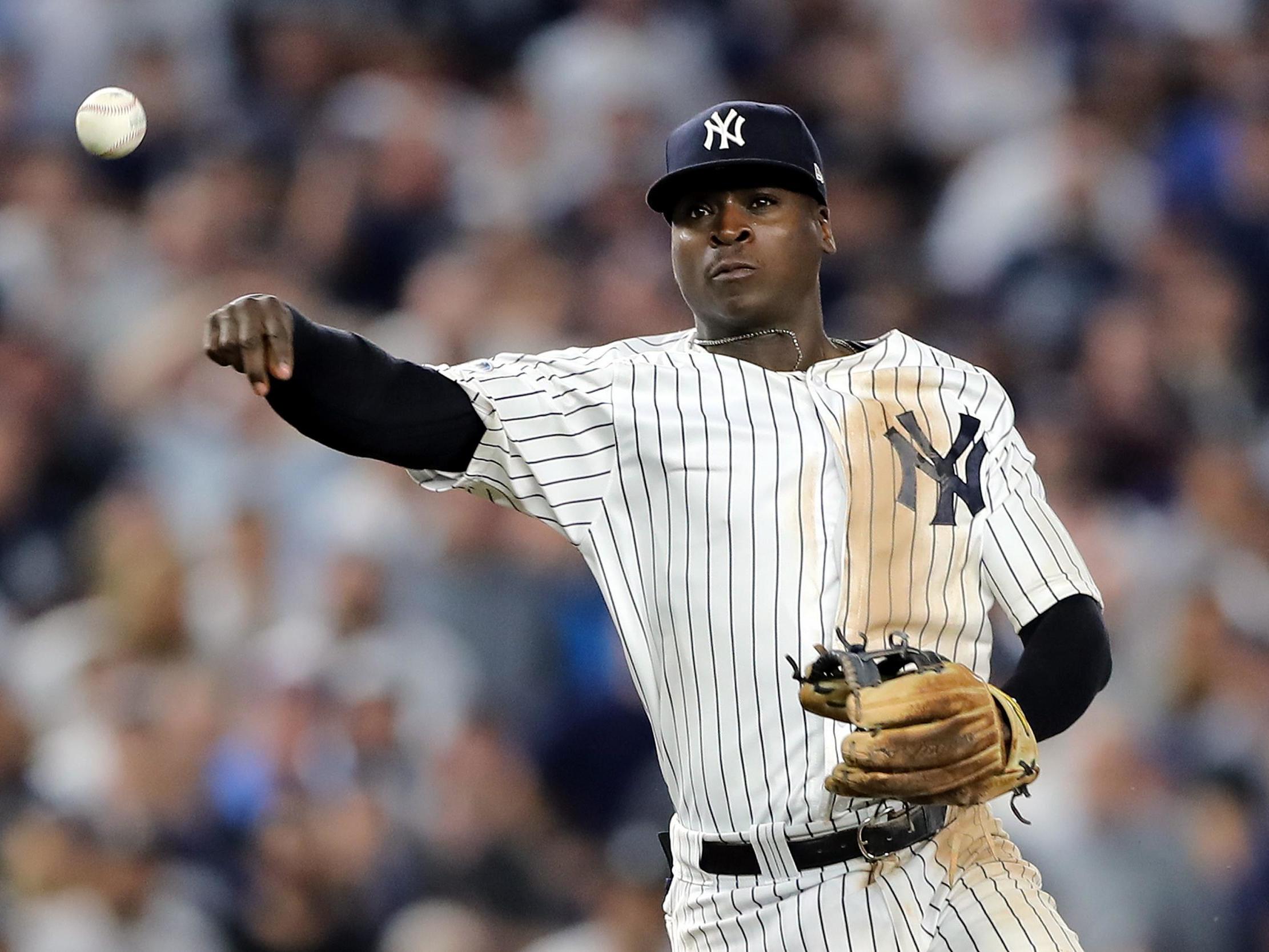
Coming to London, however, is of a different level entirely. Not since the Second World War has organised baseball been played in this country before any significant audience, and though there is a small, committed kernel of MLB fans in the UK, the target market is broader: the untapped wilderness of casual event-goers, who may not be entirely sure what a squeeze play is or how you would go about executing one, but definitely like the idea of buying hot dogs and beer from their seat while documenting the experience on their Instagram Story. The fact that MLB have managed to secure perhaps the two biggest teams in the sport is an added attraction.
“There are so many different layers,” Park says. “Especially for new fans, there’s a lot to choose from: an opportunity to dive in to those aspects of the game that they’re most attracted to. We’re going to do everything we can to showcase things in an accessible point. And we hope it’s the beginning of a conversation, an engagement of the London community, planning for the 2020 series and beyond.”
“The game has to continue to grow,” argues Dombrowski, whose boss John Henry already has an intimate connection with this country as the owner of Liverpool Football Club. “The Red Sox has always been a global team. It’s got fans all over the world, and it’s good for them to see their team up close.”
There’s a vast knowledge gulf to be breached, and much less than 28 years in which to do it. But as the old baseball commentator Red Barber put it, “baseball is only dull to dull minds”. The more you look, the more you find. The more you observe these athletes up close, the more you appreciate their gift: the immense difficulty of curving a ball from 20 yards at 100mph into a box the size of a hand towel, the skill involved in hitting it the length of a football pitch with a stick the width of a large parsnip. On one level, the idea of baseball breaking a market where it hasn’t had a foothold for almost a century seems outlandish, almost ridiculous. But like anything else in this rich and puzzling sport: sometimes, youneverknow.
On 29-30 June 2019, the Boston Red Sox are playing in the first ever MLB London Series against the New York Yankees at London Stadium. To get access to pre-sale tickets and for all the latest event updates, register at mlb.com/london-series
Join our commenting forum
Join thought-provoking conversations, follow other Independent readers and see their replies
Comments
Bookmark popover
Removed from bookmarks